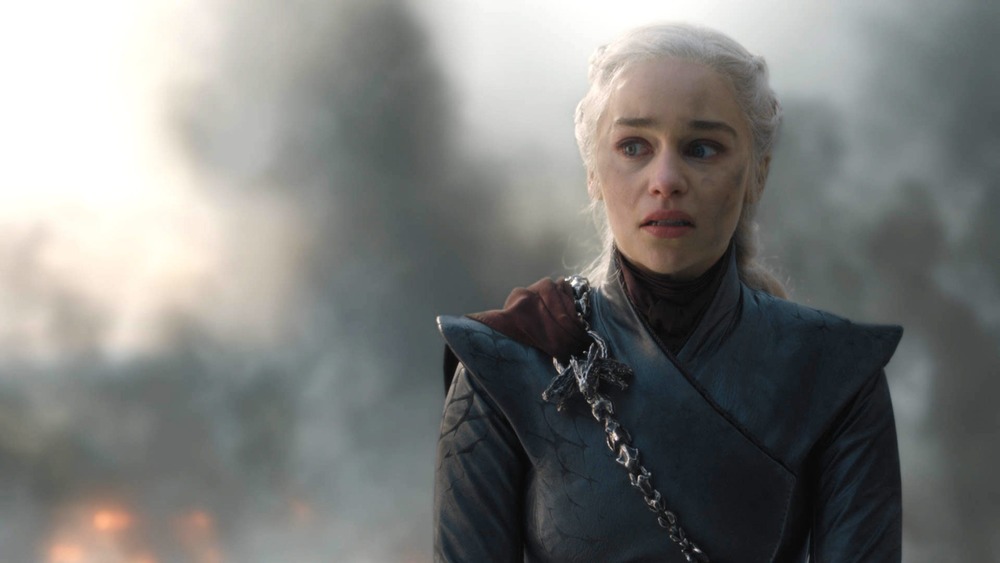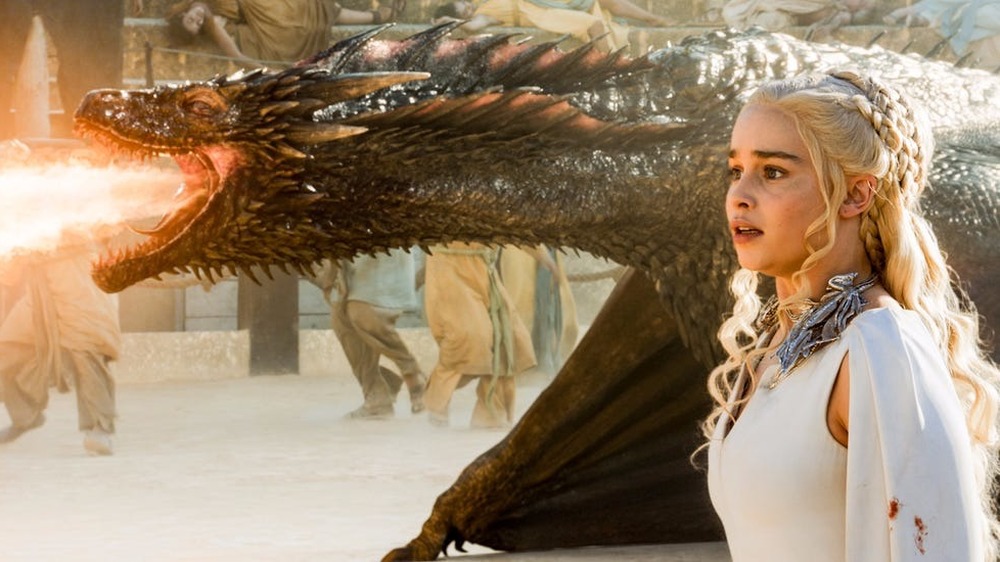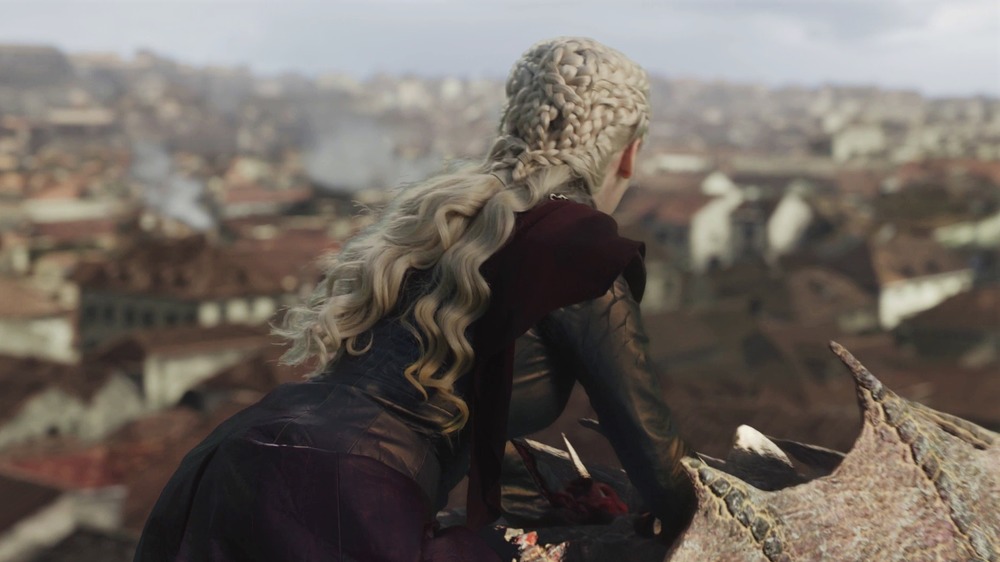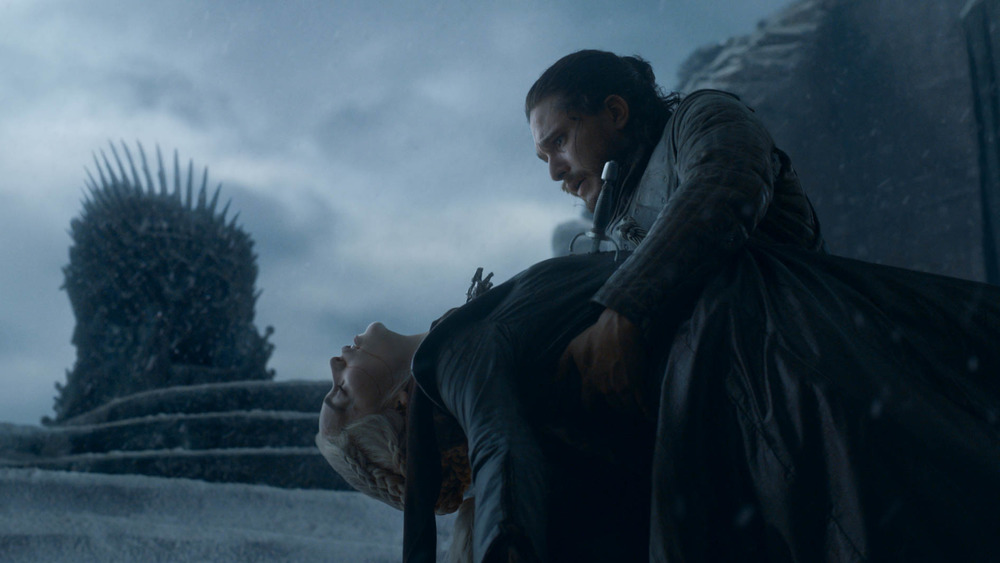The Controversy Behind Daenerys' Big Game Of Thrones Twist Explained
When Game of Thrones came to an explosive end in May of 2019, fans were dismayed and disappointed thanks to the final season's rushed pace, abandoned character arcs, and lackluster twists... but one of the series' biggest turns proved to be its most controversial. Spoilers for Game of Thrones ahead!
Throughout the series, viewers rooted for Daenerys Targaryen (Emilia Clarke), the Mother of Dragons and Khaleesi of the Dothraki horse lords, to win Westeros' powerful Iron Throne as she made her way across the world to take back her birthright as a Targaryen. However, along the way, there's no denying that Daenerys leaves a trail of blood and destruction in her wake, but typically, it seems like it's in the name of justice and righteousness; however, in the series' penultimate episode, "The Bells," Daenerys takes an incredibly dark turn.
After unleashing her armies and remaining dragon upon the capital of the Seven Kingdoms, King's Landing, Daenerys hears the bells ringing, indicating that the city has surrendered to her rule. Despite that, Daenerys torches the entire city, killing countless innocent civilians and even children in a merciless rage, seemingly betraying everything about her character up until that point. Ultimately, Daenerys becomes the kind of tyrant she always fought, and her lover and nephew, Jon Snow (Kit Harington) ends up making an impossible choice, killing his queen before she can massacre again.
In James Hibberd's sprawling oral history of Game of Thrones, Fire Cannot Kill a Dragon, the Entertainment Weekly editor at large reveals interviews and behind-the-scenes tidbits about the making of the series, including the decision to turn Daenerys into the Mad Queen. Here's the controversy behind Daenerys' big Game of Thrones twist, explained.
The Game of Thrones showrunners say Daenerys' big twist was always planned
The final season of Game of Thrones may have seemed rushed to some, showrunners David Benioff and D.B. Weiss claimed it was always in the works, taking shape early in the series.
"We didn't know the details until after the third season, but Dany's trajectory was implicit in the first season," Weiss said. "You're so rooting for her because she's in this horrible position. But there are a million different ways Emilia could have played watching her brother [Viserys] die [in the first season], and she played it with a stone-cold-killer-like lack of effect. She has dark currents running through her. Which makes sense when Viserys, the only person she knew growing up, was a sociopath."
Harington agreed, saying, "She did some terrible things. She crucified people. She burned people alive. This had been building. So we had to say to the audience, 'You're in denial about this woman as well. You're culpable, you cheered her on. You knew there was something wrong.'"
Apparently, producers and directors sometimes, according to Hibberd, "gave Clarke notes about how to play a moment, nudging the character toward her tyrannical destiny." Clarke, for her part, remembers those directions... and remembers fighting back.
"There were a number of times I was like, 'Why are you giving me that note?'" Clarke recalled. "While I am quite consistently a 'How can I help?' kind of person, there were a few moments where I was like, 'Don't tell me what to do with my girl. I know what to do!' It's like Daenerys' calling card became cold expressionlessness. I always wanted to infuse that with some humanity because no one's consistently that."
Some people involved with Game of Thrones were confused and upset by Daenerys' twist
Though many showrunners and producers knew what lay ahead for Daenerys, some of the creative team actually had no idea; as director Alex Graves put it, "I actually did not know we were telling the story of Daenerys going the way of her ancestors. I thought we were telling the story of her not doing that."
Nathalie Emmanuel, who played Daenerys' right hand woman Missandei — and whose murder at Cersei Lannister's (Lena Headey) hands spurs Daenerys' murderous rage — was dismayed by the decision. "It broke my heart," Emmanuel admitted. "I knew she lost her mind, but until you see it in all of its glory and the destruction it causes, you can't really comprehend it. I'm not sure Missandei meant that by 'Dracarys [her last words].' Missandei was in heaven somewhere going, 'You kind of went over the top there. I meant get Cersei, not, like, everyone.'"
"I was really sad she went crazy," Emmanuel continued. "I was such a Daenerys fan. She was such a female icon. She had nothing and built herself up and got this army. There was a part of me that was disappointed. But then when you think about it, she's lost everyone around her that meant anything to her. You can understand how it happened. I would have loved it if she only killed her enemies and sat on her throne and was the queen of everything."
Daenerys' fate was as tragic as it was disappointing
In the end, Daenerys paid a tragic price and died in her lover's arms before she could ever take the throne, in a fitting yet devastating ending to her story. "The woman just wanted love her whole life," Jason Momoa, who played Daenerys' husband Khal Drogo in the first season, told Hibberd. "If you see the whole journey she went through and how she was obviously mishandled by her family, and then had a husband she fell in love with, and then has her baby taken away, and then has to kill her husband. And then all the people and dragons and things that she's loved... she just had the sh*t beat out of her and then she crashed. She goes off on everyone. It's just sad."
Producer Bryan Cogman agreed with Momoa: "She's a tragic figure in that very Shakespearian/Greek sense. Emilia threaded that needle beautifully. It was the hardest job anybody had on the show that season."
Clarke, who had to portray Daenerys' descent into tyranny, ultimately stands by the decision. "After ten years of working on this, it was logical, because where the f**k else can she go?" Clarke said bluntly. "It's a logical change of events that happens. [...] She's a Targaryen. And your childhood and upbringing affects your choices in life so greatly. She was brought up with the Iron Throne being the only goal. That need to say, 'I did it for my family, for my everything, I went there and we conquered.' That no member of her family died in vain for this. That her life hadn't been for nothing. That she hadn't been struggling for nothing. She was that close to fulfilling that seal of approval, that thing we all secretly want. That plays a major role as to why she goes there."
"But having said all of the things I've just said... I stand by Daenerys," Clarke concluded. "I stand by her! I can't not."
All of Game of Thrones, including Daenerys' dark turn, is available to stream on HBO Max now.



